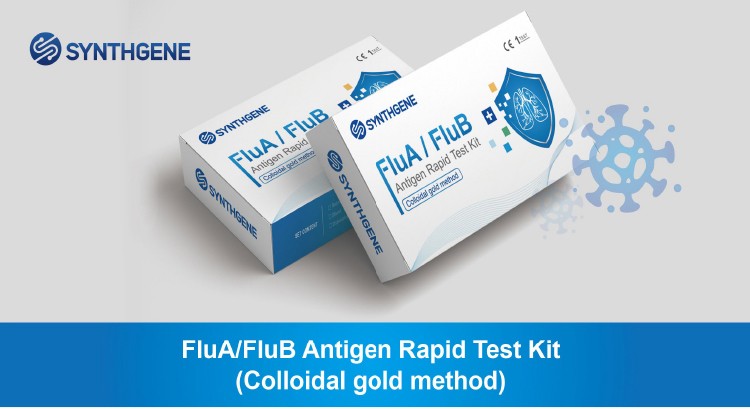Business Type:Others
Country/Region:China
Ddu Verified
HOT Rank


Nanjing Synthgene Medical Technology Co., Ltd
Nanjing Synthgene Medical Technology Co., Ltd. is a high-tech enterprise focusing on the development, production of in vitro diagnostic (IVD) materials and POCT diagnostic reagents. The company has
Business Type:Others
Country/Region:China
Ddu Verified
HOT Rank


【Product name】 FluA/FluB Antigen Rapid Test Kit (Colloidal gold method)
【Packaging specification】 1 test/bag, 1/5/10/25/50 Test(s) /kit
【Intended use】 FluA/FluB Antigen Rapid Test Kit (Colloidal gold method) is used for in vitro qualitative detection of influenza A/B virus antigens in human nasal swab and oropharyngeal swab samples. Influenza viruses include three types: A (Flu A), B (Flu B), and C (Flu C). Type A is the most likely to cause epidemics, followed by type B, and type C rarely causes epidemics. Influenza A virus can be divided into 16 subtypes (H1-H16) and 9 subtypes ( N1-N9). Among influenza A viruses, there have been reports of human infection with subtypes H1, H2, H3, H5, H7 and H9. Influenza virus is mainly transmitted by air droplets, often causing fever, fatigue, muscle aches and mild to moderate respiratory symptoms. In severe cases, it can cause pneumonia, myocarditis and heart failure.This product can be used for the auxiliary diagnosis of influenza. The antigen detection reagents for each subtype of influenza A virus can also be used to distinguish seasonal influenza viruses from new influenza A viruses, and to obtain epidemiological information on influenza outbreaks. Clinically, it is mainly used for the differential diagnosis of influenza A/B. This product is suitable not only for professional medical personnel to test in medical institutions, but also for consumer self-test. The traditional laboratory diagnostic technique is the isolation, culture and identification of viruses. For rapid diagnosis of patients, indirect or direct immunofluorescence and ELISA methods are used to detect viral antigens. Methods such as PCR, nucleic acid hybridization, or sequence analysis are also used to detect influenza virus nucleic acid or for typing
【Testing principle】 The product adopts the principle of double antibody sandwich. During detection, if there is influenza A/B virus antigen in the sample, the influenza A/B virus antigen in the sample is bound to the colloidal gold-labeled antibody (colloidal gold-chicken IgY-influenza A monoclonal antibody 1 and colloidal gold-chicken IgY-influenza B monoclonal antibody 1 ) on the binding pad, to form a labeled antibody-antigen complex.The complex is chromatographed upwards by capillary action and is captured by the detection area (A, B) coated antibodies (Influenza A monoclonal antibody 2 and Influenza B monoclonal antibody 2) on the nitrocellulose membrane, and red band(s) appear. The complex continues to move forward and is captured by goat anti-chicken IgY antibody coated on the quality control area (C) of the nitrocellulose membrane, and a red band appears. When the content of analyte in the sample is lower than the minimum detection limit, the detection area (A, B) does not develop color.
【Main components】
1.Test pad, individually packaged in aluminum foil bag (1 piece/bag, 1/5/10/25/50 piece(s)/kit)
2. Sample diluent (1 piece/bag, 1/5/10/25/50 piece(s)/kit)
3. Medical waste bag (1 piece/bag, 1/5/10/25/50 piece(s)/kit)
4. Extraction tube (1 piece/bag, 1/5/10/25/50 piece(s)/kit)
5. Instruction manual (1 copy/bag, 1 copy/kit)
Note: The components in different batch numbers of kits are not interchangeable.
【Sample requirements】
Sample collection
Nasal swab: First, blow the nose with toilet paper, carefully unpack the nasal swab, and avoid touching the swab head. Raise the head slightly, hold the swab tail in one hand, and slowly insert the swab 1-1.5 cm into one nasal cavity (for subjects aged 2-14 years, 1 cm deep), then rotate at least 4 times (with a duration of not less than 15 seconds). Next, repeat the same operation for the other nasal cavity using the same swab.